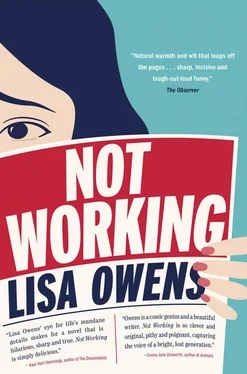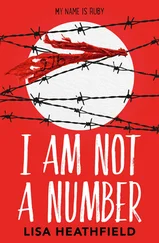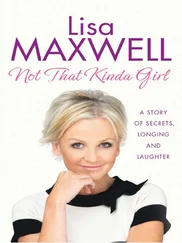“It’s both.”
“Ignore the email I just sent you, then,” I say, referring to the dossier pulled together from my afternoon’s online research.
When I had a job, I used to fantasize about what I’d do if I didn’t have to work anymore. Go to the gym every day, get really fit, train for a marathon perhaps. Finish Ulysses, read Moby Dick and one of the big Russian guys. Get to grips with the economy, also modern art.
I still haven’t registered with a doctor in London, despite Luke’s incredulous nagging and the fact I’ve lived here for nearly eight years. Luke remains entirely unperturbed by Sarah’s diagnosis, but just to be finally, unequivocally sure, I make an appointment to see our family doctor.
“Claire,” says Dr. Patterson when I enter, “it’s been a while. What seems to be the problem?”
I say, “It’s probably nothing. I don’t really know why I’m here.”
His bedside manner hasn’t changed: an off-putting blend of amusement and skepticism. His smile deepens when I get to the déjà vu, via a number of arduous caveats.
“First things first: are you pregnant?” he asks.
One hand flies to my stomach, the other to my head. “I don’t think so. Is this a symptom of pregnancy?”
“Well, no,” he admits, “but a woman of your age…Let’s say it doesn’t hurt to rule it out as part of any health conversation. You’re sure?”
“Certain. I can’t be. My boyfriend— partner —and I are very safe.”
Dr. Patterson chuckles. “You’d be surprised how many times I’ve heard that from women who turn out to be some way along.”
“Is that true, then, about déjà vu being linked to brain tumors, or…?” I ask, trying to sound not bothered either way.
“Been consulting Dr. Google?” He swoops in without warning, flashing a light in my eyes. “I think you’ll be absolutely fine,” he says, and as an afterthought asks, “No headaches? Dizziness? Sickness?”
I shake my head. “I just wanted to be on the safe side.”
He presses his lips together. “We all want to be reassured from time to time, don’t we? Often these worries can be brought on by stress. Are you having a busy time at work?”
“It’s…it’s a bit complicated,” I say. “I’m between jobs at the moment. By choice, I mean. I haven’t been fired or anything.”
“Ah.” He takes off his glasses and sits back in his chair, huffs on the lenses and thumbs them with a hanky. “Sometimes, when we have too much time, we worry unduly about our health. If we don’t have the daily distractions of, say, a job or”—he gestures to my stomach—“a family to look after, we might find our focus becoming quite…narrow.” He blinks nakedly a couple of times, then replaces his glasses. “Insular,” he adds, in case I’ve failed to recognize that this is the talk he gives the lonely people who find excuses to come in for the company.
“It’s just temporary,” I say. “I’m waiting to hear about a few things.” Though I’ve heard nothing since the blue-plaque deadline weeks ago, I remain optimistic about my chances.
“Was there anything else?” he asks.
I decide against telling him I wake in the night convinced I feel lumps in my armpits and breasts.
“Not a thing,” I say, smiling widely as I get up to go.
—
On my way to the train station after my appointment, my mother’s car goes by: I’d know that slow-rolling Beetle anywhere. I raise my hand at its tail end, on the off-chance I’ve coincided with her once-in-a-journey check in the rearview mirror. The blinker flashes, and as the car heads right, her face turns to me before she trundles out of view.
“I never thought I’d be a mother, and then you came along,” she has said on more than one occasion.
An email, at last, from the heritage people informing me my blue-plaque application has been unsuccessful. They do not say why, but do say why they can’t say why (“overwhelming response”) and express a friendly hope that my interest in heritage will nonetheless “continue to thrive.” They have misspelled my name.
—
When Luke gets home from work, it’s nine thirty. He’s startled when he turns on the light to see me at my laptop in the near-total dark and I imagine how I must look: hunchy, lemur-like, crazed.
“You okay?” he asks.
“I didn’t get the job.”
“The — Oh. I’m sorry. That sucks,” he says, and other platitudes I don’t listen to as I turn back to the fruits of my post-rejection research: resume tips, information about funding grants for niche post-grad studies, Wikipedia articles about those niche post-grad studies subjects, nannying jobs, bar jobs, admin jobs, expensive intensive residential cookery courses, fast-track routes for law, medicine, the civil service, agencies specializing in ski-season placements in Canada, Europe, New Zealand, Russia, programs for living and working abroad in Japan, South America, China, the UAE. I have more than twenty different windows open, each displaying so many tabs my computer has taken the executive decision to file the overflow in cumbersome sub-tabs.
“Do you want to talk about it?” Luke asks.
“Nothing to talk about,” I say, hitting the power button and signing out with the electronic shutdown chime.
Throughout my working life I’ve had emails addressed to: Clare, Clair, Clara, Cara, Kate, Louise, Catherine, Carol, Cleo, Caroline and Derek .
A lunchtime walk down by the canal, which lies flat and still as glass. There is no one around and for one tiny second I consider taking off into the water. The afternoon shivering as I’m swallowed up.
I’ve been keeping a list on my phone of business ideas, should I chance upon an adventurous millionaire. So far it reads:
1. Black milk (for goths?)
The standard-issue public-library smell — musty pages, instant coffee — still holds the promise of knowledge and new worlds, so I can’t be all that jaded yet. Besides me, there are three other users: a Rastafarian man poring over the bookies’ betting odds, a woman in a burka, shoulders shaking as she watches something on one of the computers, and a huge bearded white guy wearing long shorts, cruising the shelves with plastic bags bunched hemorrhoidally from both fists.
While waiting for my ancient laptop to load, I pick out a title from the shelf next to me called Surviving in the 21st Century, a compendium of disorders and syndromes, which range alphabetically from ADHD to schizophrenia, via depression, Internet addiction, IBS and perfectionism. I open it and read from the chapter on hoarding:
Early signs include a tendency to group things into piles, with the intention of coming back to them later. These can often be a manifestation of emotional blockages: sadness, defeat, confusion or sometimes even ambition or hope. The Hoarder often struggles to distinguish between what is important or useful and what is not.
My computer’s labored whimpering has given way to a grinding gurgle, which means it’s ready to use, so I slap the book shut and slot it back on the shelf.
“Darren, it’s Clive,” the librarian is saying into the phone. “I wanted to check if Michelle knew whether Jeff Jones had left his new mobile number with Angus? We’ve lost a digit, so we’re a bit stuffed.”
Читать дальше












